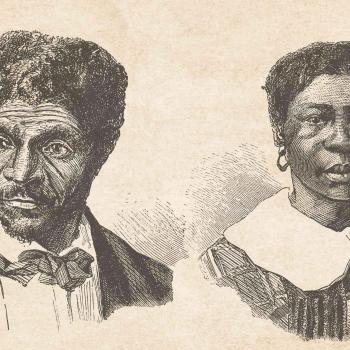No doubt, you have seen that Stormy Daniels, the porn “star” who allegedly had a sexual liaison with Donald Trump, has become a media darling. Now, given the stark partisan divide in our nation, there is a tendency to view this story solely through a political lens. However, I am most concerned about what this story, and how it is treated in the public square, says about our culture. You see, her infamy is troubling. After all, this is a woman whose life’s works—or better yet, whose body of work—seems to be enticing men, even married ones, to lust after her. Indeed, porn dealers like Daniels—just like drug dealers—revel in their ability to prey on those who have a weakness for their vice, even if other women and their families are damaged in the process. In any case, several years ago, I wrote the below, which appeared in the Washington Post, when stormy weather blew into the lives of a few other high-profile men. In my view, the question I posed then is still very relevant today.
_______________________________________________________________________

On May 3, 1980, a hit-and-run driver killed Candy Lightner’s 13-year-old daughter, Cari. Candy was devastated. But she was also mad — not only about the senseless death of her daughter but also because of the lenient sentences given to repeat DWI offenders. Lightner decided to make the tragedy of Cari’s death something positive for herself and for other families. She turned her outrage into action and organized Mothers Against Drunk Driving.
Recently, as a litany of high-profile men has made headlines for infidelity, I have been reflecting on why a Lightner-style, mother-led campaign has not been launched. You see, Anthony Weiner is just the latest in a long line of famous men who have been exposed. Arnold Schwarzenegger, John Edwards, Tiger Woods, and Eliot Spitzer also have been publicly excoriated for succumbing to temptation. But the women with whom they cheated, who all knew they were getting involved with married men (all but one of whom were fathers), have not drawn similar criticism. In fact, the opposite is true: They have been celebrated.
Rielle Hunter, with whom John Edwards had an affair, helped create a wreckage of grand proportions for Elizabeth Edwards and her children. But Hunter was given star treatment by “The Oprah Winfrey Show.” In that interview, she said that she “didn’t regret the affair” and that she had simply “followed her heart.”
What was call girl Ashley Dupre’s penance for helping Spitzer devastate his wife and daughters? She became a New York Post “advice” columnist and has been a featured panelist on “The View,” where she tried to portray herself as a victim. In late 2009, “Extra!” even sought her marital advice for Tiger Woods and his wife.
Of note, Woods was reported to have cheated with multiple women. But take the treatment of just one, Jaimee Grubbs. She landed a photo shoot with Maxim, graced the cover of another men’s magazine, and conducted several media interviews.
The circumstances of these affairs vary but there are troubling common threads. Yes, many people feel sympathy for their wives. But consider how high-profile adulterous affairs play out in the media: The shamed husband and father is dragged into the public square, generally now before cameras, for a well-deserved “stoning.” And the “other woman” is escorted on stage by a team of publicists, lawyers, and other handlers who turn her into a celebrity.
There is a danger when fame and infamy are synonymous.
We are, as a society, a long way from making such women wear a scarlet “A.” But it was not so long ago that the community of mothers was organized and vocal and got fighting mad at women who were a danger to their families.
Our society needs similar values today.
Back then, women who preyed on other women’s husbands were shunned, shamed, and excluded, not made into media darlings. They were publicly pointed out as “those kinds of women” to young girls as examples of what not to become, and to young boys as the type of women not worthy of their attention.
Mothers knew that these women were as much predators as they were prey. That’s why they were called ‘‘home wreckers” in polite company and worse when the kids were not in earshot. These angry mothers, while rightly holding their husbands and the fathers of their children to the pledge of fidelity, realized what would happen not just to their families but also to society if this type of behavior was celebrated rather than confronted.
Where are today’s Candy Lightners? Isn’t there something to be mad about?













